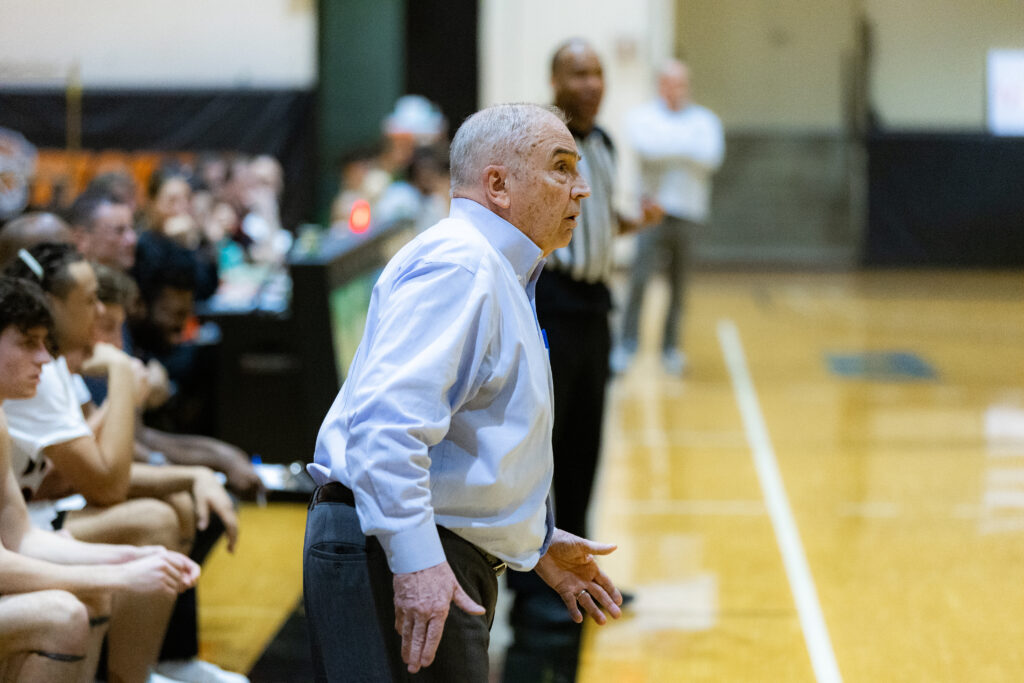
By STEVE BRADLEY
For the past several years, Bob McVean has taken a few weeks at the end of each basketball season to contemplate his future.
This spring, after his 40th season leading the men’s basketball program at Rochester Institute of Technology, McVean reached a different conclusion. It was time to step away.
“I said to my wife, ‘I feel pretty good, well, maybe I’ll go one more year,’ McVean recalled. “She said, ‘Don’t even think about it.’”
And, just like that, the man who ranked third among active coaches in Division III men’s basketball with 613 career victories announced his retirement on March 18 after a 44-year career at RIT and Eisenhower College.
“I have been blessed to be able to do something that I’ve loved to do,” said McVean, who went 556-490, made six NCAA Division III Tournament appearances and won five Empire Athletic Association championships and two Empire 8 titles during his tenure on the Tigers sideline. “It hasn’t been a job, it has been working with young people and that’s something that keeps us all young.”
McVean exits as the 18th winningest coach in NCAA men’s basketball history, but his impact extends far beyond his record.
“Wins are nice, and he has plenty, but I hope he is most proud of the confidence he instilled in hundreds of young men,” said Troy Pierre-Louis, a 2018 RIT graduate who averaged 15.1 points per game his senior season. “He prepared us for games, but most importantly he prepared us for life, and we’ll always be most thankful for that.”
“RIT is definitely losing a great coach, but an even better man,” said Jeff Molisani, a standout player at Clyde-Savannah, who played point guard on McVean’s 1993 team that won the ECAC Upstate Division III championship. “He was like a second father. Even though I was only an hour away from home, he was always there for me and his door was always open.”
The Tigers finished 14-13 and reached the Liberty League semifinals this season. McVean expressed gratitude to the RIT administration, players, assistant coaches and support staff – both past and present –and, of course, his family. He also gave a special nod to this year’s team while explaining his decision for choosing to retire now.
“These guys were really great through the year, and I really enjoyed them, not that I haven’t enjoyed other groups,” said McVean, who earned his 600th career victory in the Nov. 14 season opener against Wells. “But, I think that this is the right decision for me while I still have my health, even though it is going to be a major change in lifestyle.”
Indeed, it will be.
McVean will remain at RIT through the end of the spring semester teaching a basketball wellness course and assisting in any way he can as the search for his successor continues. When he exits it will signal the end to a 70-year basketball odyssey.
Pavilion Pride
McVean’s passion for sports can be traced back to his hometown of Pavilion, a one-stoplight town in the southeastern corner of Genesee County.
The McVean family lived on a farm a few miles on the outskirts of town where a strong work ethic was instilled from an early age.
McVean’s father, Scotty, drove school bus, worked as head custodian at Pavilion Central School and served as town supervisor for more than 20 years. He was also a beekeeper with more than 250 hives.
“We never had sugar in the home, we only had honey,” McVean said.
Bill Pitcher moved to Pavilion in third grade and became fast friends with McVean and the other boys in the class of 1964. The group developed a love for sports that only grew deeper when a man by the name of Jack Flowers arrived in town and began coaching them in middle school.
“Summers were devoted to playing in somebody’s barn or down at the church,” said Craig Muehlig, McVean’s longtime friend. “That’s where we got to know each other.”
Pitcher rode his bike a few miles to McVean’s house where they played intense games of 1-on-1 in the gravel driveway or made their way down the road to play 3-on-3 or 4-on-4 in the barn of another teammate, George Spinnegan.
Games were to 21, win by two.
“They never ended at 21,” Pitcher said. “Sometimes we’d play to 50, the games were usually 38-36 or something like that.”
Afterwards, they would indulge on delicious honey-baked cookies and pies made by McVean’s mother, Ruth.
“She always had treats waiting for his friends,” Pitcher said. “She was such a warm person and so welcoming, he’s the same way.”
By the time McVean and friends reached high school, they had developed quite a rapport on the basketball court.
“We played so much ball, we all loved it,” Muehlig said. “Even when they had the junior-senior play, if you weren’t in the scene and had 15 minutes during rehearsal, you would run down to the gym and shoot hoops.”
Team members loved basketball so much that they even tried to get in some extra practices by sneaking into the school on a few Saturday nights for a full-court run, but that ended abruptly after they were spotted leaving the building by a school employee one evening.
“We didn’t go anywhere but the basketball court or the drinking fountain,” Pitcher said. “We got to go in and play on the regulation hoop. We got away with it for a while, but then we didn’t.”
“We didn’t get in any trouble or anything,” Muehlig said. “The principal just talked to us and said, ‘Guys, you can’t do that,’ and it never happened again.”
The Golden Gophers proceeded to go 17-2 as juniors and then crafted a perfect 21-0 season, capped by a one-point win over Naples in the Section V Class C championship game, as seniors.
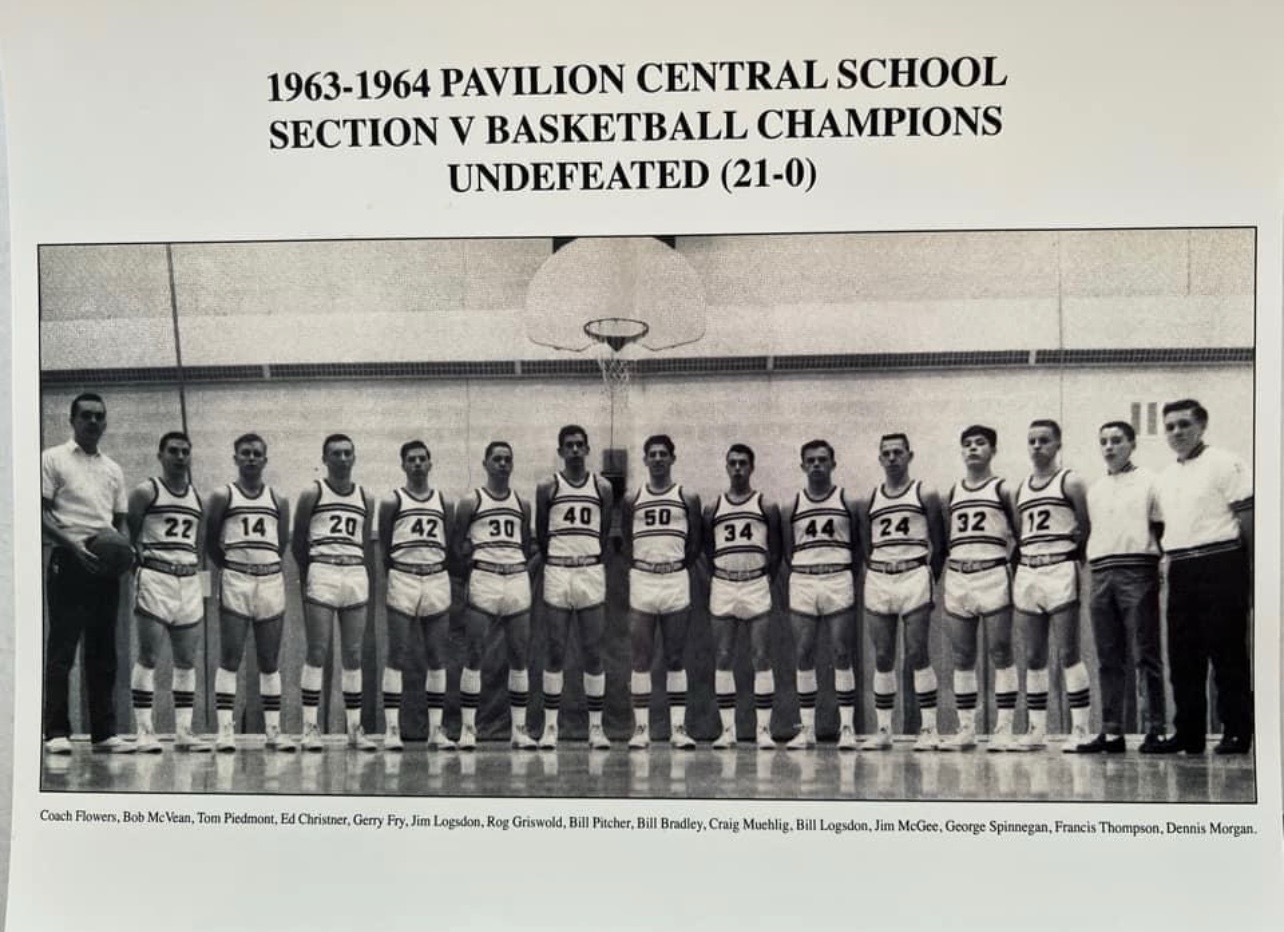
Despite being a consistent contender through the years, Pavilion did not win another Section V boys basketball title until 1998 and the 1963-64 team remains the gold standard among Golden Gopher boys’ basketball teams.
Pavilion was a deep, talented team that topped more than 100 points on a few occasions. Four players averaged at least 12 points, but none more than 20.
“It was a different era,” said Pitcher, who earned a basketball scholarship to Canisius. “We were never on offense, we were always on defense. We pressed, we stole the ball, we scored and then we stole it again.”
McVean was a lock-down defender who did his part.
“He ran around and stole the ball from everybody that we played,” said Muehlig, his starting backcourt mate. “He was quick and he was smart. He had a lot of energy. I love Bobby, he was a great guy to have with you.”
The group had a reunion two years ago when nine of the 11 living members of the team gathered in Batavia to reminisce. McVean helped to make sure that the group could connect with the two teammates living out of state and remembers everyone on the squad, including the manager and ball boy, by name.
“Bobby’s the best, he hasn’t changed,” Pitcher said. “When we got together with that team it was like we had practice the day before, and some of us hadn’t seen each other in 58 years. He is truly steadfast and loyal and he pays attention to every detail. He always wants to get the job done in the best way possible.”
A winding road
McVean, who played football, basketball and baseball at Pavilion, wasn’t certain of his future plans as his senior basketball season wound down.
That changed when one of the Canisius assistant coaches came to watch Pitcher play and spoke to him about attending the Buffalo college as a walk-on.
McVean accepted and spent two years at Canisius, where he played freshman basketball and two seasons of baseball, as an accounting major. However, something did not feel right.
“I just could not see myself sitting at a desk and crunching numbers for the rest of my life,” McVean said.
Coaches rarely take a linear path and McVean is no exception.
He left Canisius and transferred to Brockport State to major in health and physical education. He also played basketball and baseball for the Golden Eagles before graduating and landing his first job at Holley in 1969.
The job came with a caveat. Holley was in need of a varsity wrestling coach, so McVean, who won more games than any men’s basketball coach in RIT history, actually got his start in an entirely different sport.
“I was fortunate to have four or five really good wrestlers,” McVean said. “I got them in shape and I had some seniors who were excellent and they helped me teach some of the moves to the younger wrestlers.”
The team finished with a .500 record and McVean moved on to Byron-Bergen, where he coached the junior varsity boys basketball team for two seasons and the varsity for one.
Then Flowers came calling. McVean landed a job teaching health at Sodus and joined his old high school coach as the junior varsity coach and varsity assistant at Hobart College.
After four years at Hobart, McVean was hired as the head coach at Eisenhower College. Men’s basketball coach was a part-time position, so McVean kept his teaching job, making the 40-minute drive back and forth to Sodus from his home in Seneca Falls each day before practice, games or going recruiting.
“I had no idea,” said Steve Sisson, who played for McVean at both Eisenhower and RIT. “He never missed anything, he was there non-stop.”
McVean compiled a 58-45 record in four seasons before Eisenhower, which was a satellite campus of RIT, closed.
McVean joined Mike Neer’s staff as an assistant at the University of Rochester for the 1982-83 season while several of the Eisenhower players transferred to RIT.
Bill Nelson, who later went on to coach 31 seasons at Johns Hopkins, left RIT to become the coach at Nazareth in 1983. RIT hired McVean to coach its men’s basketball team, and, in an example of how the landscape has changed over the years, coach six physical education classes. UR hired Jay Wright, who went on to win two NCAA Division I championships at Villanova, to fill its assistant spot vacated by McVean.
Earning his Tiger stripes
McVean’s first team at RIT finished with an 8-16 record and it took six seasons under his tutelage for the Tigers to finish above .500, but he continued to build relationships as he rebuilt the program.
“Coach McVean’s greatness is really about him waking up every single day and putting forth his best effort,” said Victor boys basketball coach Tyler Roberts, who served five seasons as an assistant under McVean from 2012-17. “It wasn’t one moment that made him great, it is truly his persistence over time and his impact on all of the people that he has come in contact with.”
Chris Reed, who coached for 33 seasons in Section V at Geneseo and Rush-Henrietta, played for McVean from 1984-86 at RIT.
“Our teams were always prepared, we worked hard and he was a lot of fun to play for,” Reed said. “He reminded me a lot of my high school coach, Jim Cox, who I played for at Rush-Henrietta. Bob McVean was kind of the same style, he could relate to you, but when it was time to go to work you worked hard and he pushed you.”
Both on the court and in the classroom.
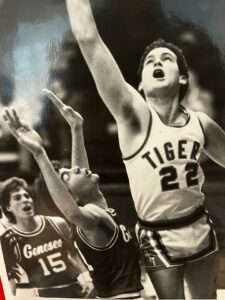
“He instilled the importance of education,” said Sisson, who graduated from RIT in 1985 after transferring from Eisenhower and went on to enjoy a 30-year career in corporate finance. “It gave me an opportunity to have a career that I could only dream of.”
McVean’s practices were structured and his expectations high. Messaging was direct and honest.
“I’ve always said that if we stop correcting you, you better watch out because that means that we don’t care,” McVean said. “The players accept that nothing is ever personal and that is the way that we have approached both recruiting and the team, and they know that we care.”
RIT put together a pair of 14-12 seasons in 1988 and ’89 before reeling off six straight winning seasons between 1991 and ’96-97. The 1994-97 teams led by three-time All-American Craig Jones of Webster went a combined 67-13. Jones and Irondequoit graduate Aaron Morrison led the 1997 team that won a school-record 24 games and reached the Sweet 16 of the NCAA Division III Tournament.
“Coach McVean took a chance on me as a basketball player,” said Jones, who scored a school record 1,984 points. “I wasn’t initially recruited by that many colleges, but he noticed something in me and my potential. Coach continued to push me while also providing me with confidence and support. There were many times my freshman year I wanted to give up as I wasn’t playing that much, but with his guidance I stuck with it and worked on my skills throughout and after my first season and became a much better player due to coach.”
McVean finished with six 20-win seasons and coached 10 of the top 12 scorers in RIT history and 22 1,000-point scorers during his tenure, but his greatest gratification came from alumni returning to campus with their families and sharing their success stories with him.
“Obviously, players that we recruit want to continue their basketball career and athletic career, but in the long run, after graduation, the important thing is what are you going to do with the next 30 or 40 years of your life?” McVean said. “That’s kind of the way that we have always approached it.”
Many, including Sisson, are grateful.
“For a small-town kid from Alexander, N.Y., I was able to retire at 52 years of age and I wouldn’t have done it without Bob McVean and RIT,” Sisson said. “He was pretty influential in the impact that he had on my life and I know that I am not the only one.”
Camping he will go
In addition to his accomplishments as a coach, basketball camps are also big piece of McVean’s legacy.
McVean attended his first basketball camp, run by former Rochester Royal and NBA Hall of Famer Al Cervi, with several of his high school teammates in Inlet, N.Y. in 1963. The staff included former NBA player and legendary Eastridge coach Al Masino and a young guard from the Syracuse University basketball team named Jim Boeheim.
Basketball camps were not prevalent at the time and the concept resonated with McVean.
A couple of years later, McVean accepted a summer job as a player/counselor at the Batavia YMCA’s Camp Arthur G. Hough in Perry.
Tom Sisson, Steve’s older brother, was a junior in high school at the time and was a teammate of McVean’s.
“All I had to do was get open and the ball was in my hands,” said Sisson, who went on to score more than 1,000 points at SUNY Geneseo and coach boys basketball at Warsaw and Oakfield-Alabama. “He was a terrific player.”
McVean met someone else at Camp Hough, too. A scorekeeper named Debbie Swartz from Batavia. They will celebrate their 50th wedding anniversary in June.
In addition to offering skill coaching and competition for players, Camp Hough also offered a clinic for coaches. Each coach would arrive the day before camp opened and present to the staff, so the coaches were learning, too.
“I had never seen anything like that,” McVean said. “It was pretty innovative.”
When McVean arrived at Eisenhower, he started his own basketball camp. McVean’s staff was a virtual who’s who of Section V coaches and the camp focused on skill development and competition. Near the end of the week campers took a skill test and were ranked among their age group in several categories, including vertical jump, speed dribble, passing, shuttle and the Mikan drill.
“There was a guy that came to camp called George Lehmann (a former NBA and ABA player and shooting guru) and he always said that skills were the divider,” McVean said. “I thought that it was important to give players some things that they could take home and work on in order to improve.”
The typical camp schedule included two skill sessions, a lecture, three games and three meals with a little bit of down time built in.
“It was a long day,” McVean said. “We’d finish up by 9 or 9:30, but generally we’d been going since 8 in the morning.”
The camp continued to grow, peaking at about 360 campers after it moved to RIT.
“Everything was first class,” said former Irondequoit coach Chris Cardon, who was a regular on the staff. “Bob took care of the coaches and you really liked working his camp. It was hard work, but it was fun and that’s where I met Tom Downey (Livonia), Dave Gillett (Perry), Scott Allen (Kendall) and others. You got to meet these guys and get to know them and become friends with them. By the end of the time, you were tired, but you knew that you had made yourself better as a coach.”
Reed found the camp beneficial, particularly during the early stages of his career.
“It was just a great camp to network and get ideas from so many coaches and watching their styles and what they did,” he said. “For a young coach it was a great way to spend part of your summer learning.”
The summer basketball landscape changed with the emergence of AAU and other leagues and tournaments, leading to a decline in popularity for overnight basketball camps.
McVean pivoted and started a successful team camp that he ran for several years. The COVID-19 pandemic brought an end to his camps after more than 40 years of offering growth opportunities for players and coaches.
“I really enjoyed the camps and all of the time with players and coaches,” McVean said.
Coaching orchard
One of the keys to McVean’s coaching longevity was his willingness to adapt. While offenses were more geared toward post play during his early years, the game shifted to become more guard-focused in recent years.
“Coach McVean was always willing to adjust to his personnel,” Roberts said. “He would always try to make offenses fit the players that we had and make sure that our defenses would play to our players’ strengths and that is a really big piece that I took from Coach McVean.”
He developed his own style from the coaches he played for and worked with, along with those he met in coaching circles.
He credits Flowers, who won more than 1,000 games as a high school and college coach, with being a motivator and innovator and was certainly influenced by Neer during his one season at UR. He also picked up some things along the way from contemporaries such as former Hamilton coach Tom Murphy, a friend and one-time rival, and the likes of Dean Smith and Bob Knight, who he saw speak at clinics.
McVean’s coaching influence is a bit more difficult to measure, given his many connections throughout the high school and college basketball communities.
Reed, Molisani, who served more than 15 years as the varsity coach at Marion, and former Penfield coach Jeff Rogers all played for McVean at RIT and went on to coach in Section V.
“I always knew that I wanted to coach and he basically made me want it even more,” said Molisani, who used the same offense he ran as a player at RIT in his first season as a coach.
Reed, who won 428 games and five Section V championships during his career, played for legendary coaches Cox, Jerry Everling (football) and Don Fazio (baseball) at R-H before playing for McVean at RIT. Each was influential in their own way.
“I took a little bit from all of them and with Bobby it was just the way that he conducted practice,” Reed said. “I took a lot of the things that he did in practice to my practices and the way that he communicated with players was similar to my high school coaches, and that was something that I could gravitate to. I had a lot of good guys to emulate to form my own coaching style.”
Several of McVean’s former assistants have gone on to become college head coaches, including current bench bosses Rob deGrandpre at Hilbert, Dan Bozzelli at Purchase and Jake Scott at Keuka.
Former Section V coaches Stan Sherwood (Byron-Bergen), Tim McMullen (Letchworth), Tim DiSanto and Allen have all worked as RIT assistants under McVean.
Roberts, who has guided Victor to back-to-back Section V Class AA titles and the 2023 New York State Public High School Athletic Association championship, is appreciative of his time with the Tigers.
He credits McVean with helping him learn how to scout and game plan, as well as to trust his assistant coaches. Communication, kindness and respect are other takeaways for Roberts.
“At RIT, they circle up at the end of every practice and that is something that we do at Victor, and we do that throughout our whole program now,” Roberts said.
For Reed, seeing McVean step away is a full-circle moment.
“At first he was my coach, then he was a mentor and then he became a friend,” Reed said.
Roberts, who grew up in Boonville, N.Y., in Section III, continues to be impressed with the number of people McVean has impacted throughout his career.
“Every single person that I know in the Section V basketball community has a story about Coach McVean,” Roberts said, noting that his college roommate reached out to him after he found out he was working at RIT and told him that he still had a T-shirt from one of McVean’s camps.
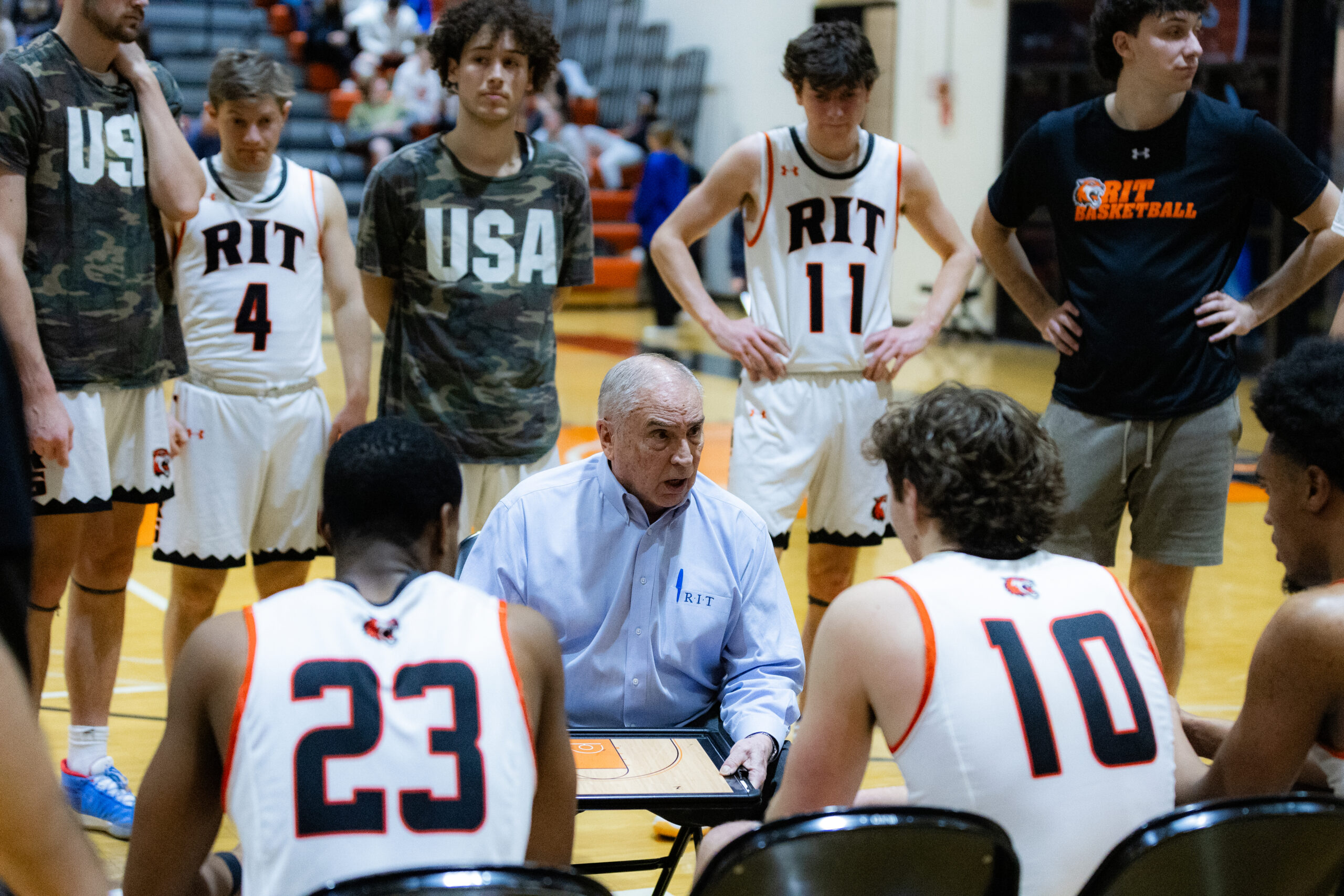
Moving on
McVean admits that retirement will be an adjustment for him.
“Vacationing and cruises don’t excite me at all, but I’ll find something” he said. “I’ve got that ‘to-do’ list at home and I’ve neglected it for 40 years.”
He recently had lunch with Neer, who advised him to “give it some time.”
His three children, Carrie, Tara and Scott, who is the senior associate director of intercollegiate athletics at RIT, all live in the area and have blessed him and Debbie with seven grandchildren.
Debbie, who swam at Cortland State, shares her husband’s love of competition and he is grateful for her support over the last half-century.
“She held down the family, that’s for sure” McVean said. “I am so lucky that I was able to do something that I loved and I am just so thankful that I have that support.”
He has been overwhelmed with messages since announcing his decision. The well-wishers include Jeff VanGundy, who McVean attempted to recruit to RIT before VanGundy opted to attend Nazareth, former Nazareth, Canisius and Michigan head coach John Beilein, and hundreds of former players, assistants and members of the Section V and college basketball coaching communities.
Because he is still teaching, McVean has not started to clean out his office yet.
“I don’t even want to think about that,” he said. “I’ve still got notebooks filled with 40 years of practice plans. Maybe we will have a bonfire if nobody wants them.”
He may want to hold off on that idea.
McVean recently received a text from his grandson, Cole, who is in eighth grade and falling in love with basketball.
“Grandpa, you are not going to have long to retire because you are going to start coaching me,” it said.
Sounds like a perfect plan. Summer is coming, time to get those cones ready and set up the skill stations.
Congratulations!
I, to this day, remember his words.
“Practice does not make perfect. If you practice wrong, you’ll be perfectly wrong. Practice makes permanent. So, practice correctly and make it permanently correct.”
Thanks, Coach!
— Courtney Gage (@volsfangage) March 20, 2024



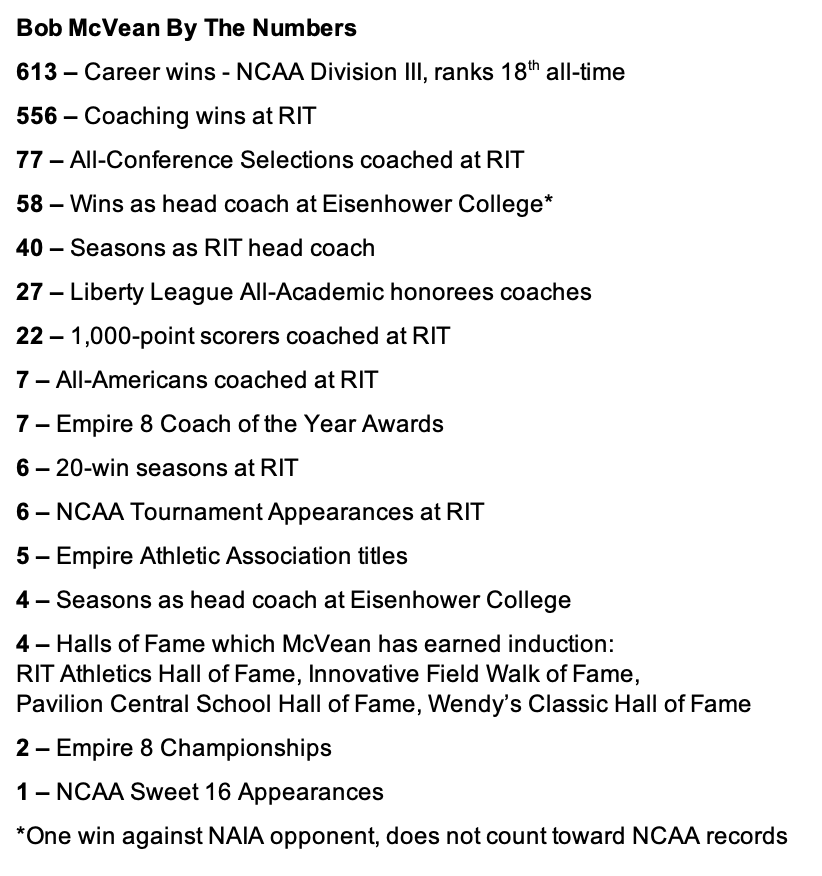
Steve, great article. Bob is quite a guy as are most of the people in the article. So many memories. I was the Camp Hough director during the last basketball camp. It was sad to say the least.
Again, great job
Played basketball and baseball with Bobby McVean @Canisius. Great competitor and a classy guy. Glad he did so I well in a field he loved.
Best regards,
Terry Connors